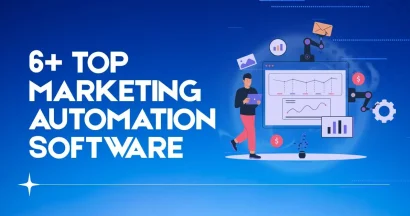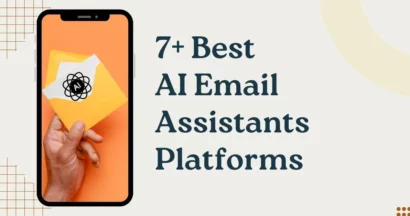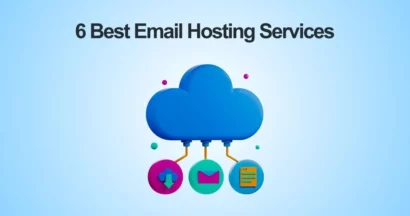Email marketing continues to be one of the most effective and cost-efficient methods for connecting with an audience, nurturing leads, and increasing sales. Selecting the right platform is not just a technical choice; it is a critical business decision. However, the market is filled with numerous email marketing platforms, each presented as a complete solution.
This guide will help you navigate these options to find a platform that aligns with your budget, business goals, and technical expertise.
We have analyzed their features, evaluated their user experience, and compared their pricing to provide a definitive list of the top email marketing platforms. Whether you are a creator launching a newsletter, an ecommerce store recovering abandoned carts, or a B2B company automating sales funnels, this review will help you find the best email marketing platform to achieve your objectives.
Eduma – Education WordPress Theme
We provide an amazing WordPress theme with fast and responsive designs. Let’s find out!
Key Features of an Email Marketing Platform
Before reviewing the platforms, it is important to understand what distinguishes a high-quality service from an average one. When evaluating any email marketing platform, consider these six core components to make an informed decision.
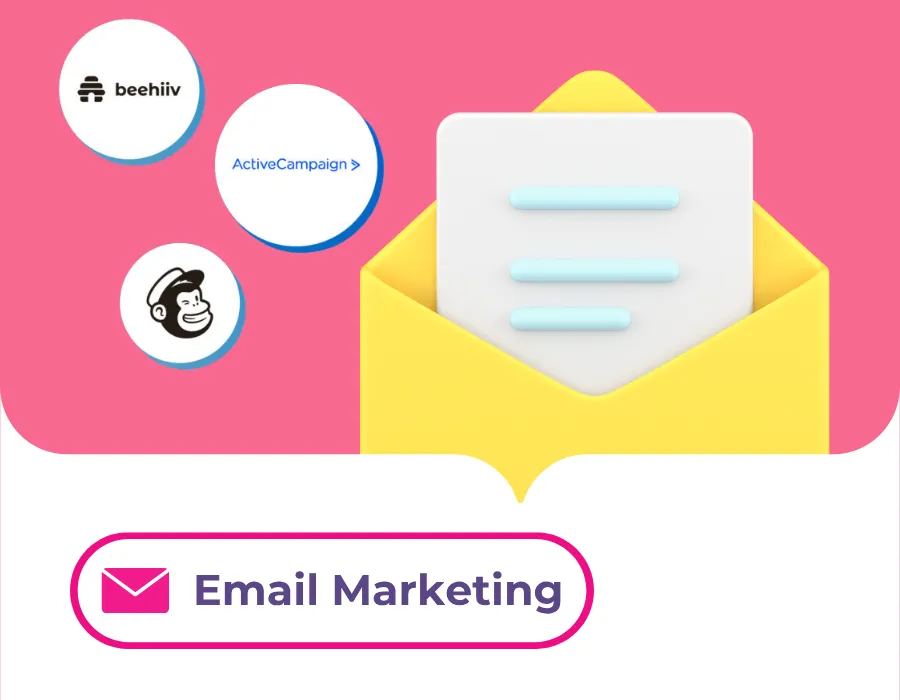
1. Intuitive Drag-and-Drop Email Editor
Your team should not need advanced coding skills to create professional and responsive emails. A modern email editor should be visual, intuitive, and include a variety of pre-designed templates. This allows for the quick creation of professional campaigns that display correctly on all devices, from desktops to smartphones.
2. Powerful Marketing Automation
Marketing automation software is a core component of modern email marketing platforms. Look for platforms that offer a visual workflow builder to create automated sequences. This can range from simple welcome emails for new subscribers to complex, behavior-triggered campaigns that nurture leads based on specific actions, such as visiting a webpage or clicking a link.
3. Integrated Landing Pages and Forms
Growing your email list is essential for success. Leading email marketing platforms provide built-in tools to create high-conversion sign-up forms, pop-ups, and landing pages. This reduces the need for third-party tools and streamlines your lead generation process within a single platform.
4. Advanced Segmentation and Personalization
Mass email campaigns are becoming less effective. To engage your audience, you need to deliver the right message to the right person at the right time. Tools like an AI email assistant can help refine this process. Effective segmentation allows you to group subscribers based on demographics, purchase history, and engagement, while personalization inserts relevant content.
5. Flexible and Scalable Pricing
The platform you choose should be able to scale with your business. Look for transparent pricing plans that meet your current needs but offer a clear path for expansion. A comprehensive free plan or a full-featured trial is a key benefit, as it allows you to test the service before making a financial commitment.
6. Excellent Deliverability
An email is ineffective if it does not reach the recipient’s inbox. High deliverability rates are essential, which is why choosing one of the best email hosting services can also play a role. Reputable platforms invest significantly in their sending infrastructure and provide tools to help you maintain a clean list and a strong sender reputation.
The 14 Best Email Marketing Platforms
Here is our detailed analysis of the top services, based on extensive testing and evaluation.
1. MailerLite: Best for Getting Started with Email Marketing
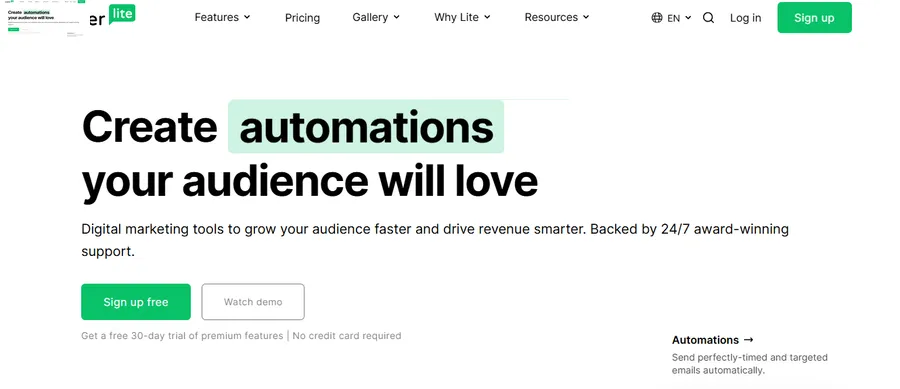
MailerLite offers a strong balance between simplicity, features, and affordability. Its clean, intuitive interface makes it a suitable choice for beginners, freelancers, and small businesses that require a straightforward solution for creating and automating email campaigns. Despite its user-friendly design, it includes essential features like automation, landing pages, and a website builder.
- Pros
- User-Friendly: The drag-and-drop editor is clean, responsive, and easy to use.
- Good Value: Offers one of the most generous free plans available, and its paid plans are competitively priced.
- Effective Automation: The visual workflow builder is ideal for creating welcome series, abandoned cart reminders, and other automated campaigns.
- All-in-One Tools: Includes a landing page builder, sign-up forms, and a website creator.
- Strong Deliverability: Maintains a dedicated team focused on ensuring high inbox placement rates.
- Cons
- Limited Advanced Automation: While suitable for most needs, its automation is not as complex as platforms like ActiveCampaign.
- Few Language Options: The user interface is available in a limited number of languages.
- Pricing
MailerLite offers a free plan for up to 1,000 subscribers and 12,000 emails per month. Paid plans start at $9/month.
2. Brevo (formerly Sendinblue): Best for Free Email Marketing
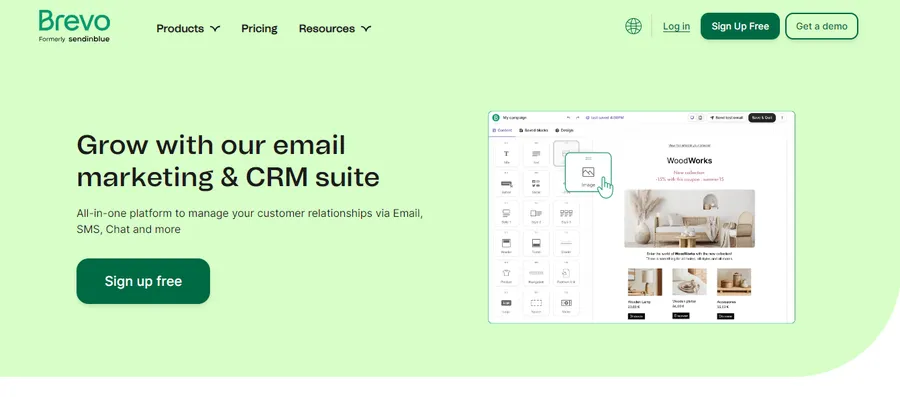
Brevo has evolved into a comprehensive digital marketing and sales platform. It combines email marketing, SMS, live chat, CRM, and transactional emails. Its most notable feature is its generous free plan, which offers a high contact limit, making it ideal for businesses that want to manage multiple communication channels without a large initial investment.
- Pros
- Excellent Free Plan: Allows up to 300 emails per day with a large contact list.
- Multi-Channel Marketing: Integrates SMS, WhatsApp, and live chat into campaigns.
- Robust Automation: Features website tracking to trigger workflows based on user behavior.
- Integrated Sales CRM: Manage customer relationships and track interactions.
- Transactional Emails: A good solution for sending order confirmations and password resets.
- Cons
- Limited Template Library: The selection of pre-designed email templates is smaller than that of competitors.
- Pricing
Brevo’s free plan includes unlimited contacts and up to 300 emails per day. Paid plans begin at $8.08/month.
3. ActiveCampaign: Best for Marketing Automation
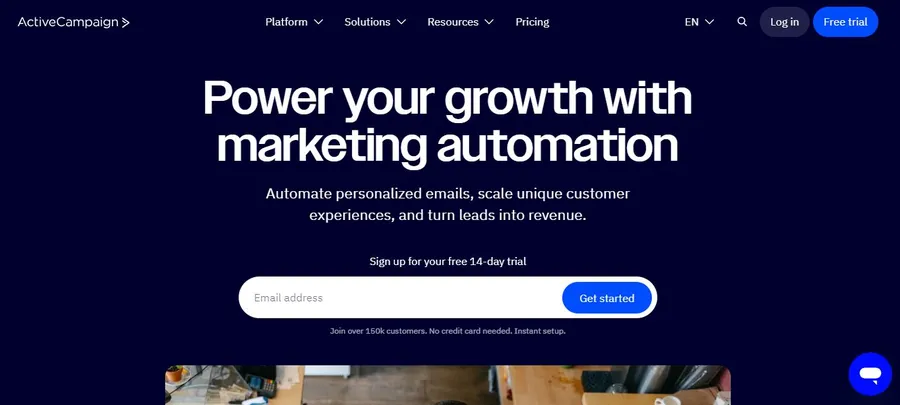
ActiveCampaign is a leader in marketing automation. It offers a powerful and flexible workflow builder suitable for businesses of all sizes. Beyond email, it integrates a sophisticated CRM to align sales and marketing efforts, making it one of the best email automation software choices available.
- Pros
- Advanced Automation: Features over 900 pre-built automation recipes and a flexible visual workflow editor.
- Integrated CRM: Connects marketing actions with sales pipelines for a unified customer view.
- Advanced Personalization: Uses site tracking and conditional content for highly personalized messaging.
- Excellent Design Tools: The email editor is intuitive, with over 240 professional templates.
- High Deliverability: Consistently ranks as a top platform for inbox placement.
- Cons
- More Complex for Beginners: The number of features can be challenging for new users.
- Higher Price Point: Can be more expensive than simpler platforms, especially for larger contact lists.
- Pricing
ActiveCampaign offers a 14-day free trial. Paid plans start at $15/month for up to 1,000 contacts.
4. beehiiv: Best for Newsletter Monetization
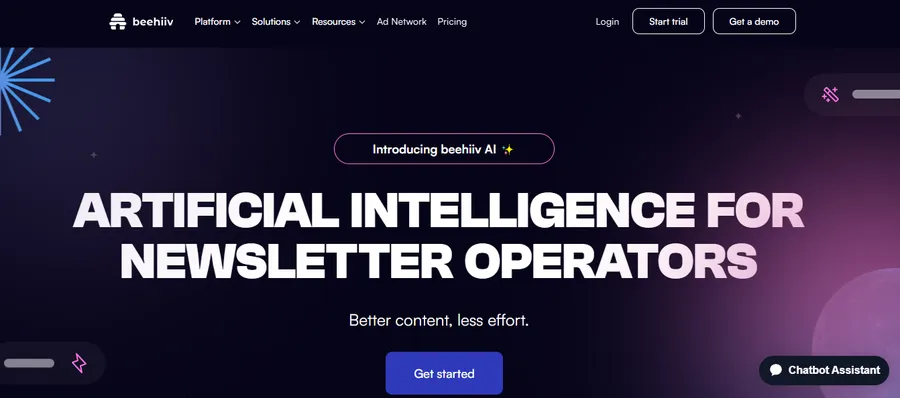
beehiiv is designed for creators, writers, and businesses that aim to build, grow, and monetize a newsletter. It goes beyond traditional email marketing by offering tools for audience growth and revenue generation, including a referral program, an ad network, and paid subscription management.
- Pros
- Creator-Focused Tools: Includes features like a referral program to accelerate audience growth.
- Multiple Monetization Options: Earn revenue through paid subscriptions, an ad network, and affiliate recommendations.
- AI-Powered Editor: The editor includes AI tools to assist with writing and content refinement.
- Advanced Analytics: Provides detailed dashboards focused on growth, engagement, and revenue.
- No-Code Website: Each publication includes a customizable website to host the newsletter archive.
- Cons
- Higher Starting Price: More expensive than many traditional email marketing services.
- Less Focus on General Marketing: Not the best fit for businesses whose primary goal is not newsletter publishing.
- Pricing
beehiiv has a free plan for up to 2,500 subscribers. Paid plans start at $43/month.
5. Moosend: Best for Small Businesses on a Budget
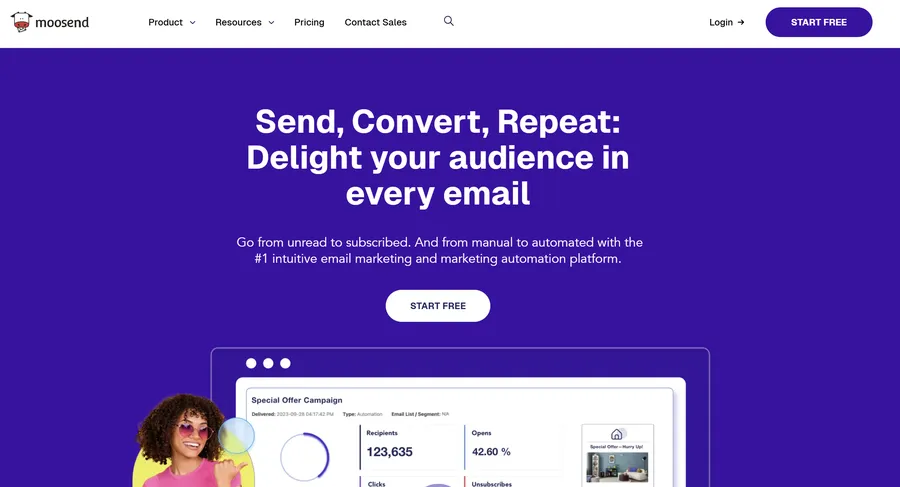
Moosend provides an impressive set of features at a very low price, making it a great choice for small businesses and startups. It is notable for providing advanced tools like sophisticated automation and personalization without restricting them to expensive enterprise plans. Its user interface is clean and consistent.
- Pros
- Great Value: One of the most affordable platforms, with no email sending limits on paid plans.
- Advanced Automation for Less: The visual workflow builder includes over 25 triggers, rivaling more expensive competitors.
- User-Friendly Experience: The drag-and-drop editors for emails, landing pages, and forms are intuitive.
- Simple Pricing: Pricing is based only on the size of your contact list.
- Behavior-Based Personalization: Use website activity to segment your audience and personalize content.
- Cons
- No Free Plan: It offers a free trial but lacks a permanent free plan.
- Pricing
Moosend offers a 30-day free trial. The Pro plan starts at $7/month for 500 contacts.
6. HubSpot: Best All-in-One Platform
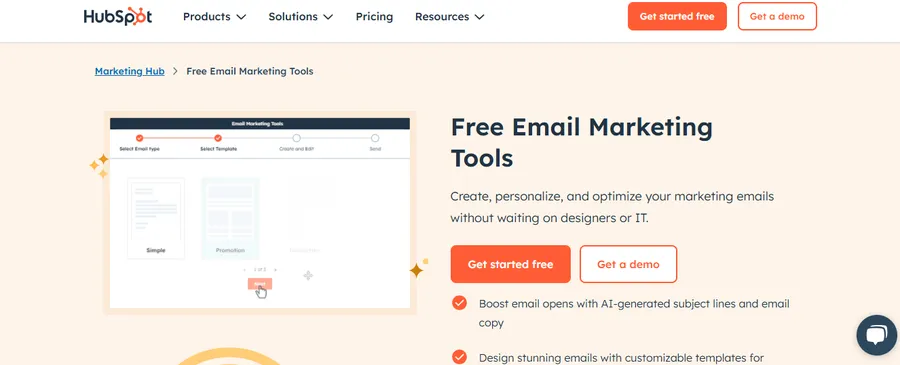
HubSpot is a complete CRM platform that integrates marketing, sales, customer service, and content management. Its Marketing Hub includes everything needed for sophisticated email campaigns, but its main strength is its seamless integration with the broader HubSpot ecosystem. This makes it an ideal choice for businesses seeking a single platform for all customer interactions.
- Pros
- Fully Integrated CRM: Provides a 360-degree customer view by connecting marketing, sales, and service data.
- Powerful Automation: Build complex workflows that span across different departments.
- Generous Free Tools: The free HubSpot CRM includes basic email marketing, forms, and landing pages.
- Scalable Solution: Offers plans suitable for businesses of all sizes.
- Extensive Integrations: Connects with over 1,500 third-party applications.
- Cons
- Can Become Expensive: Pricing can increase significantly as you add more contacts or higher-tier plans.
- Complexity: May be overly complex for users who only need basic email marketing functions.
- Pricing
HubSpot offers a free CRM. Paid marketing plans start at $20/month.
7. Omnisend: Best for Ecommerce
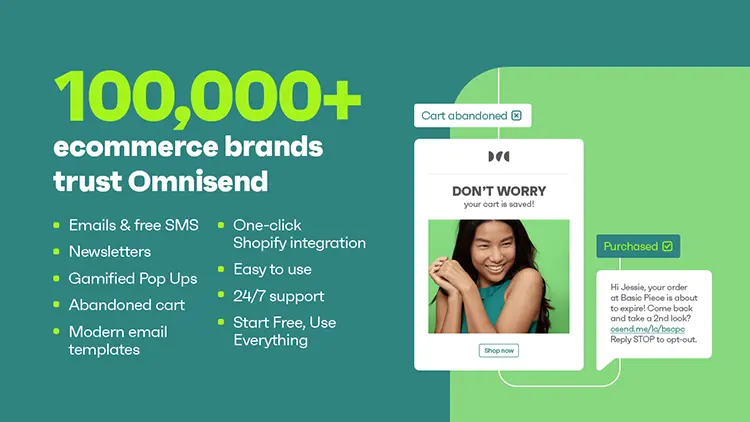
Omnisend is an email and SMS marketing platform designed specifically for ecommerce email marketing businesses. It integrates deeply with platforms like Shopify, BigCommerce, and WooCommerce, allowing you to use customer data for highly targeted and automated campaigns. Its features are focused on driving sales, with pre-built workflows for abandoned carts and welcome series.
- Pros
- Deep Ecommerce Integrations: Pulls data from your online store for powerful segmentation.
- Pre-Built Automation Workflows: Launch conversion-focused campaigns quickly.
- Multi-Channel Campaigns: Combine email, SMS, and web push notifications in the same workflow.
- Conversion-Focused Tools: Includes unique features like gift boxes and scratch cards to boost engagement.
- Excellent Support: Offers 24/7 live chat and email support on all paid plans.
- Cons
- Lacks a Product Page Builder: Does not include a built-in tool for creating product pages.
- Pricing
Omnisend has a free plan for up to 250 contacts and 500 emails per month. Paid plans start at $16/month.
8. AWeber: Best for Email Design and Templates
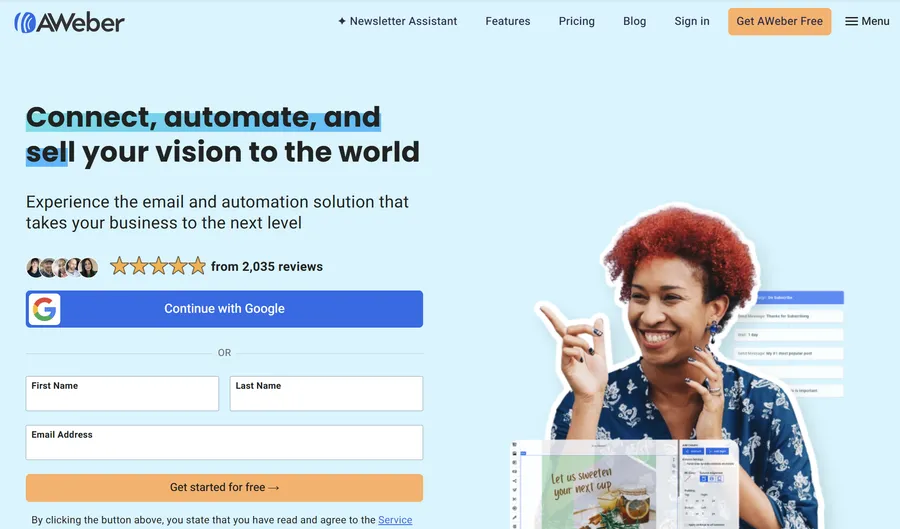
AWeber has a reputation for reliability and ease of use. Its primary strength is making it simple to create professional emails. With a large library of templates and an AI-powered design assistant, AWeber is a good choice for users who prioritize professional-looking campaigns without a difficult learning process.
- Pros
- Large Template Library: Access to over 600 professionally designed email templates.
- Smart Designer: Automatically creates branded email templates based on your website’s URL.
- Integrated Canva Button: Design custom graphics directly within the AWeber email editor.
- User-Friendly Interface: The drag-and-drop editor is straightforward for beginners.
- Extensive Integrations: Connects with over 750 third-party tools.
- Cons
- Basic Automation: Automation capabilities are limited to simple autoresponders and lack advanced conditional logic.
- Pricing
AWeber offers a free plan for up to 500 subscribers and 3,000 emails per month. Paid plans start at $12.50/month.
9. Kit (formerly ConvertKit): Best for Creators and Subscriber Growth
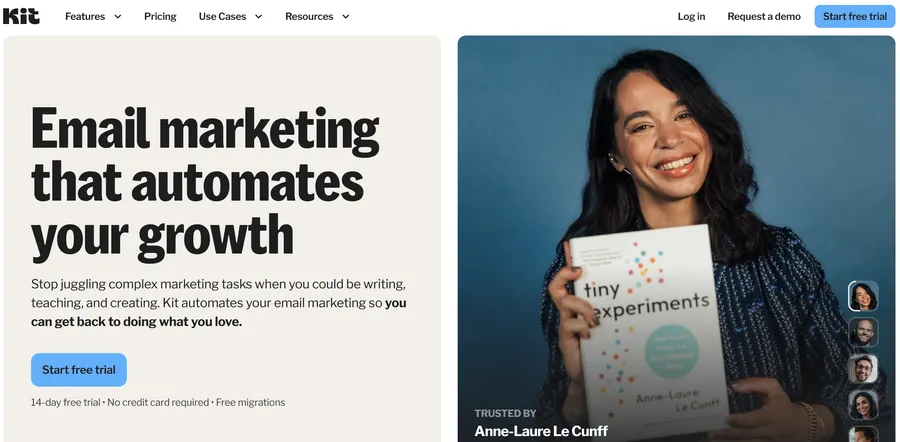
Kit is a platform built for online creators, including bloggers, podcasters, and course sellers. It excels at helping users grow their audience and monetize their work. Its features are designed for building a loyal following and promoting digital products.
- Pros
- Advanced Segmentation: Use a flexible tagging system to organize subscribers.
- Creator-Focused Monetization: Sell digital products and paid subscriptions directly.
- Creator Network: Grow your audience by cross-promoting with other creators in the Kit network.
- Powerful Visual Automation: Build sophisticated, rule-based funnels for subscribers.
- Excellent Landing Page Builder: Create high-converting pages to promote products.
- Cons
- Limited CRM Features: Lacks some of the sales-focused CRM tools found in other platforms.
- Pricing
Kit has a free plan for up to 10,000 contacts, but it limits users to one automation. Paid plans start at $39/month for 1,000 subscribers.
10. Mailchimp: The Well-Known Incumbent
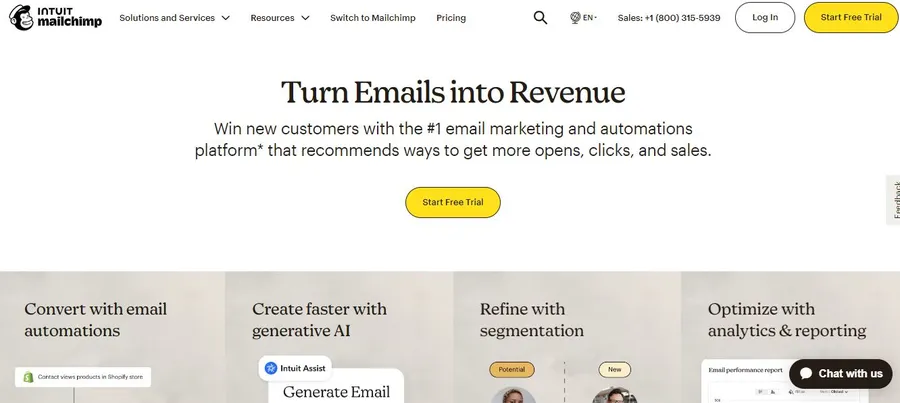
Mailchimp is one of the most recognized names in email marketing. Its user-friendly interface made it popular with small businesses. While it offers a solid email builder and a good range of features, its pricing has become less competitive, and some of its core functions are surpassed by newer alternatives.
- Pros
- Intuitive Email Builder: The editor is easy to use and well-regarded by beginners.
- Good Integrations: Offers over 300 integrations with popular platforms.
- Brand Recognition: A familiar and widely used platform.
- Cons
- Expensive: Pricing becomes costly as your list grows, and you are charged for unsubscribed contacts.
- Limited Free Plan: The free plan has become more restrictive.
- Pricing
Mailchimp’s paid plans start at $13/month for 500 contacts.
11. Campaigner: Best for High-Volume Sending
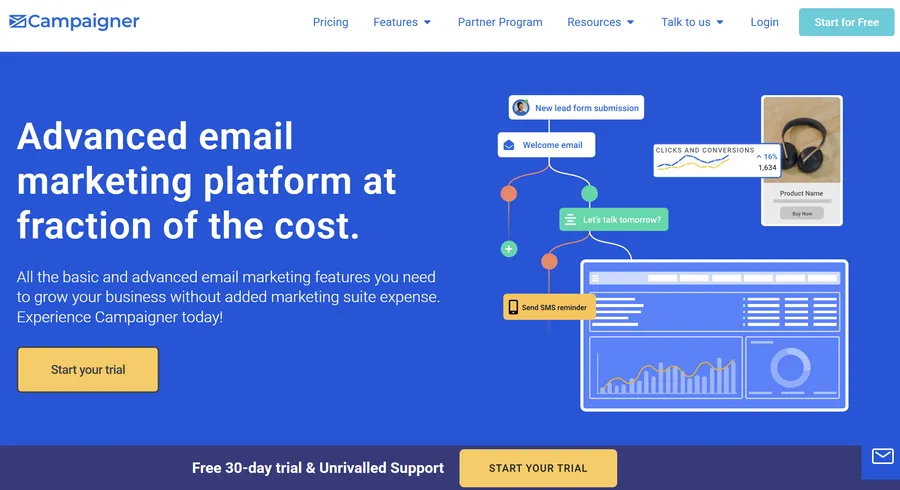
Campaigner is a feature-rich platform for businesses with large email lists that require high-volume sending. It provides a robust set of tools for automation, segmentation, and personalization, along with features to manage sender reputation and ensure high deliverability at scale.
- Pros
- Advanced Automation: Build sophisticated workflows combining email and SMS.
- Sophisticated Segmentation: Use dynamic content for precise targeting.
- Reputation Management: Includes tools to maintain list hygiene and protect your sender score.
- Built for Scale: Optimized for businesses that send a large volume of emails.
- Ecommerce Tracking: Offers conversion tracking and integrations.
- Cons
- Higher Starting Price: More expensive than many competitors, making it less suitable for small businesses.
- Pricing
Campaigner offers a 30-day free trial. Paid plans start at $59/month for 5,000 contacts.
12. GetResponse: Best for Sales Funnels and Webinars
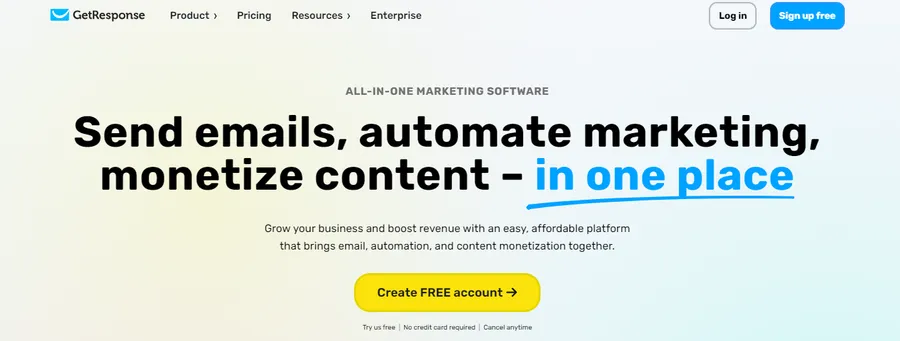
GetResponse has expanded to become a complete online marketing platform. Its unique strengths are its integrated conversion funnel builder and webinar hosting capabilities. This makes it a good choice for businesses and entrepreneurs who sell digital products, courses, or services online.
- Pros
- All-in-One Marketing Suite: Combines email marketing, landing pages, funnels, and webinars.
- Scalable Plans: Offers different tiers that grow with your business.
- Conversion Funnel Builder: A tool for visually creating entire sales funnels.
- 24/7 Support: Provides round-the-clock chat and email support.
- Cons
- Outdated Templates: Some email and landing page templates feel less modern than competitors.
- Pricing
GetResponse offers a free plan with 500 contacts. Paid plans start at $19/month for 1,000 contacts.
13. Constant Contact: Best for Event Marketing
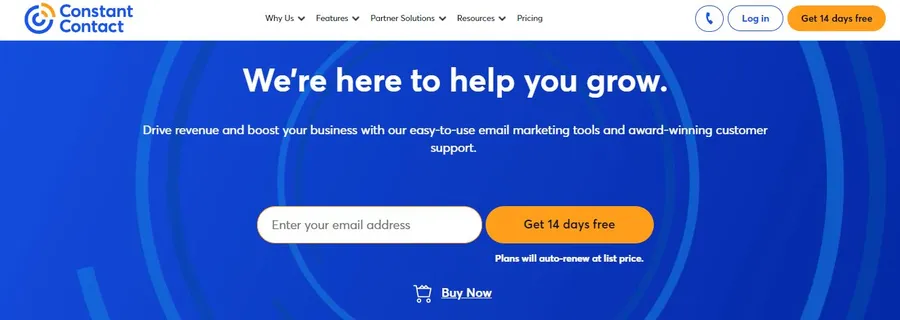
Constant Contact provides a reliable set of tools for email marketing, lead generation, and social media. A notable feature is its integrated event management function, which allows you to create invitations and manage registrations, making it a good choice for businesses that host events.
- Pros
- Strong Event Marketing Tools: A unique feature set for managing event invitations.
- Large Template Library: Offers over 300 responsive email templates.
- Integrated Social Marketing: Schedule social media posts and run ads from the platform.
- AI Writing Assistant: Helps you craft email subject lines and content marketing.
- Cons
- Basic Automation: Automation capabilities are not as advanced as those of competitors.
- No Free Plan: Lacks a permanent free plan but offers a trial period.
- Pricing
Constant Contact plans begin at $12/month for 500 contacts. A 30-day free trial is available.
14. Benchmark Email: Best for Simplicity and Speed
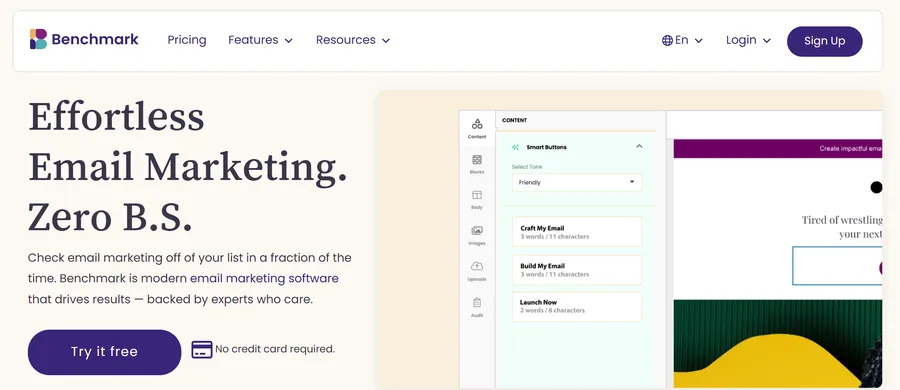
Benchmark Email focuses on making email marketing simple and fast, especially for beginners and small teams. Its platform is exceptionally user-friendly, allowing you to send your first campaign in minutes. The visual automation builder is easy to understand, and its global focus is reflected in its multilingual templates.
- Pros
- Beginner-Friendly: The interface is clean, well-designed, and easy to navigate.
- Fast Email Creation: The editor and pre-made content blocks streamline the design process.
- Multilingual Support: Offers templates and support in a wide range of languages.
- Intuitive Automation Builder: The visual workflow editor is clear and simple.
- Cons
- Limited Design Flexibility: The focus on simplicity means less creative control.
- Basic Automation Triggers: Lacks the wide range of triggers found in more advanced platforms.
- Pricing
Benchmark Email has a free plan with 500 contacts. Paid plans start at $13/month for 500 contacts.
Conclusion
Choosing the right email marketing platform is a foundational step toward achieving your digital marketing goals. As this guide demonstrates, there is no single “best” platform for everyone. The ideal choice depends entirely on your specific needs, budget, and long-term objectives—whether you are a small business needing an affordable start with MailerLite, an ecommerce store leveraging Omnisend’s targeted features, or a large organization requiring HubSpot’s all-in-one CRM capabilities.
We recommend using this analysis as a starting point. Take advantage of the free plans and trial periods that many of these platforms offer. By testing them directly, you can gain firsthand experience with their tools and determine which service is the best fit for your team. A well-chosen platform will not only streamline your workflow but also empower you to build stronger relationships with your audience and drive sustainable growth for your business.
Frequently Asked Questions (FAQs)
1. What is an email marketing platform?
An email marketing platform is a software tool that enables businesses to create, send, manage, and track email campaigns to a list of subscribers. Core features typically include an email editor, contact management, automation, and performance analytics.
2. How do I choose the right email marketing platform for my small business?
For a small business, prioritize ease of use, affordability, and scalability. Look for a platform with an intuitive drag-and-drop editor, pre-built templates, and simple automation features. Services like MailerLite or Moosend are excellent starting points as they offer powerful features at a low cost.
3. Are free email marketing platforms good enough to start with?
Yes. Many top eCommerce email marketing platforms, such as Brevo and MailerLite, offer generous free plans that are perfect for new businesses building their first email list. These plans typically have limitations on subscribers or monthly emails, but they offer the necessary tools to begin.
4. What is the difference between email marketing and marketing automation?
Email marketing often refers to sending one-off campaigns (like newsletters or promotions) to a group of contacts. Marketing automation is a broader concept where emails and other actions are automatically triggered based on a subscriber's behavior or data. For example, an automated workflow could send a series of welcome emails to a new subscriber over several days.
5. Why is email deliverability important?
Email deliverability is the measure of how many of your sent emails successfully reach your subscribers' inboxes (as opposed to their spam folders or being blocked). High deliverability is crucial because if your emails are not seen, the marketing effort is ineffective. Reputable platforms work to maintain high deliverability rates for all their users.
Learn more: 8 Must-have Digital Marketing Tools for Success
Contact US | ThimPress:
Website: https://thimpress.com/
Fanpage: https://www.facebook.com/ThimPress
YouTube: https://www.youtube.com/c/ThimPressDesign
Twitter (X): https://x.com/thimpress_com

